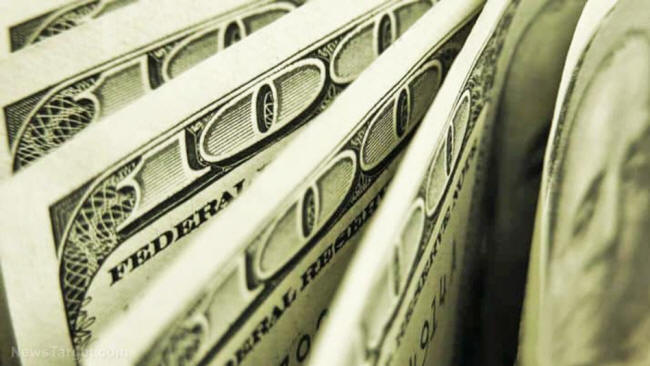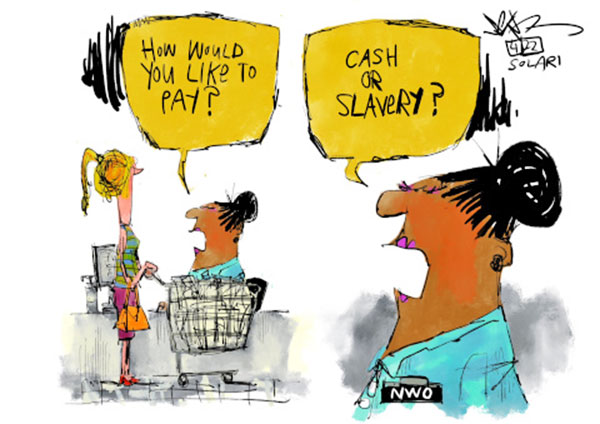(1) USE CASH
...whenever possible
- and let everyone know why you are using cash.
Walk out on
establishments that refuse to accept cash. When using remote
facilities where cash is not possible, use checks if you can.
We understand from
one subscriber that check companies are scrambling to fill the
orders of all of the bank customers who have requested checks
recently.
Whether the indicator
is banking statistics or anecdotal reports from our subscribers,
cash use is clearly rising.
(2) NURTURE ANALOG
We want a
healthy balance of digital and analog transaction options.
What we do not
want is an all-digital system - whether it is CBDCs or all of
the other digital mechanisms. Some digitization is both healthy
and efficient, but an all-digital system - with regards to
virtually anything - is vulnerable to central control and
manipulation...
Roll back your
use of digital systems, avoid biometric technology as much as
possible, and don't use QR codes!
Get invasive surveillance
systems out of your home.
Use hard-wired
Internet connections, not Wi-Fi, and find other ways to
Loosen Technology's Grip on Your Mind.
While you are at it,
refuse to use or support vaccine passports (see
22 Ways to Stop Vaccine ID Passports).
(3) SEEK INTEGRITY
Transact with
people of integrity, even if to do so appears to cost more.
In
the end, fraudsters and others who contribute to unhealthy
systems through their own greed or lust for power cause untold
losses.
All those
little expenses related to transacting with integrity can end up
being lifesavers if the alternative is you having assets in
Madoff and Lehman Brothers.
(4) BANK AT AN INTIMATE SCALE
Find a good,
well-managed local bank or credit union for your banking
business (see
How to Find a Good Local Bank).
Talk to your
bankers to educate them about the dangers to you and the bank of
a CBDC system.
See our
template letter, which you can share with your bank,
modifying it to include your own individual circumstances and
CBDC-related concerns.
(5) FINANCE YOUR FRIENDS, NOT YOUR
ENEMIES
Start reducing
your number of online and digital financial transactions and
evolve away whenever possible from relying on or investing in
the fintech and credit card companies that are,
financing and
promoting digital IDs, vaccine or health passports, and CBDCs.
Financing your
local farmer or farm distribution service may not look like a
great money-maker, but it means you will have a better chance of
not being cornered into
eating insects and
lab-grown meat.
(6) SUPPORT STATE OFFICIALS WHO
SUPPORT FINANCIAL FREEDOM
Ask your state
legislators to start a sovereign state bank like the Bank of
North Dakota to protect your right to free financial
transactions.
Make sure it is
a sovereign bank that supports (and does not and cannot compete
with) private community banks and credit unions, and helps to
ensure they can provide free private financial transactions.
While you are
at it, ask them to start a state bullion depository.
Then, in the
worst-case scenario, you can use your gold and silver as a local
currency (if your state has been smart enough to cancel sales
tax on precious metals - if not, that's another matter to bring
up with state legislators).
7) DEMAND THE NEW YORK FED BE HELD
ACCOUNTABLE
Write and call
your congressional representatives:
Tell each
representative that you are a constituent and you want them to
take the following actions, whether through legislation, denial
of funding, or other available leverage they can apply:
-
Mandate
an audit of the New York FED (which is the U.S.
government's depository and acts as agent for the U.S.
government in its financial affairs).
-
Insist
that the government agencies that have failed to produce
audits required by law, such as the Department of
Defense (DOD) and the Department of Housing and Urban
Development (HUD), and the U.S. Treasury produce annual
clean audited financial statements.
-
Trace
where the $21 trillion in funds missing from the U.S.
government accounts have ended up as part of the audits
of the New York FED, the Treasury, DOD, and HUD.
-
Provide
for a return of the missing money to the U.S. Treasury.
Clearly
communicate that congressional representatives are not to pass
any legislation or grant
the FED (most notably the New York
FED)
any more powers or funding until the FED is audited, transparent
and held accountable, and makes restitution for all illegal
transactions in U.S. government accounts held by it or its
member banks.
Congress should
not accept any argument that the executive branch has the
authority to proceed with the institution of CBDCs without
congressional approval.
Note that $21
trillion amounts to $65,000 per person in the U.S. Also note
that amounts missing subsequent to fiscal 2015 are not yet
known.
[For those who
would like to learn about the organization of the US central
banking system, see
The History and Organization of the Federal Reserve].
To learn more
about the $21 trillion missing from US government accounts and
what it means to investors, see Solari's
Missing Money and
our Missing Money
Wrap Up.]
(8) DEMAND THE U.S. EXIT THE WHO
Also ask your
congressional representatives to end U.S. membership in the
World Health Organization (WHO) and stop financing the WHO with
our tax dollars.
The WHO, among
other unacceptable actions, is using the health care system to
institute vaccine passports, which is simply a way of getting
the authentication system needed for CBDCs and spatial control...
A template
letter for use in drafting a letter to your representatives
about the pending amendments to the WHO International Health
Regulations is available
here.
(9) SAY NO TO TAXATION WITHOUT
REPRESENTATION
Regarding
taxation, the CBDC is a way to implement taxation without
representation.
Ask all of your
federal and state representatives and everyone you know before
you pay your taxes on April 15th, why we should pay
our taxes when,
-
$21
trillion, or $65,000 per person in the U.S., is missing
from government coffers
-
the
U.S. government has gone along with a system in which
the government books are cooked via Federal Accounting
Standards Advisory Board Statement 56.



